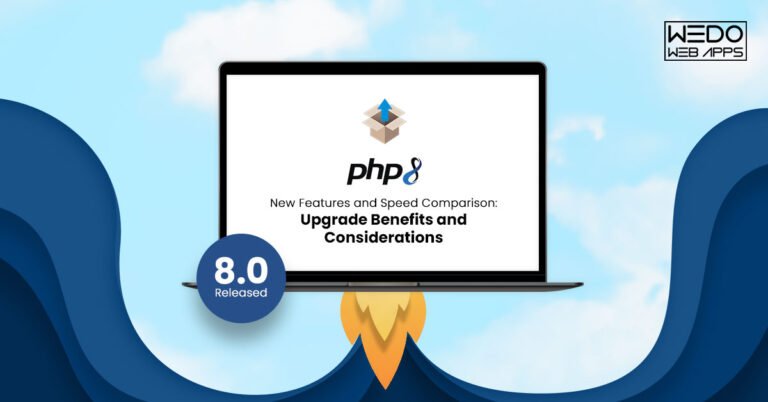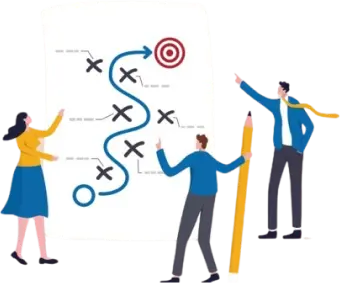12 May, 2023 | Web Development Company
PHP 8 New Features and Speed Comparison: Upgrade Benefits and Considerations

Is It Feasible To Upgrade To PHP 8 Directly?
Upgrading to PHP 8 directly may not be feasible for some websites. It is because PHP 8 has introduced several breaking modifications and amazing PHP 8 new features, which means that some websites may not be compatible with the new version. Thus, before upgrading to PHP 8, it is crucial to ensure that all the plugins, themes, and other tools used by the website are compatible with PHP 8. Another consideration when upgrading to PHP 8 is the time and effort required to upgrade. Depending on the complexness of the website, upgrading to PHP 8 may need significant modifications to the code, which can be time-consuming and pricey. It is also crucial to remember that some deprecated features in previous versions of PHP have been dismissed in PHP 8. This means some code may have to be rewritten or updated to make it compatible with the new version. If you need more help with the same then you can seek a PHP development service or can ask for assistance from the PHP versions support crew.PHP 8 New Features
If you are confused about whether is PHP 8 faster or not then you have to worry not as it is superfast. Now let’s talk about some of the latest and most exciting PHP 8 new features that you will be getting in PHP 8, and they are as follows:JIT Compiler:
One of the most striking features of PHP 8 is the inclusion of a Just-In-Time (JIT) compiler, which aims to enhance the execution speed of PHP scripts. The JIT compiler functions by compiling PHP code into machine code at runtime, which, in turn, allows more rapid execution times. Moreover, the JIT compiler in PHP 8 uses a technique named Tracing JIT, which compiles only the parts of the code that are actually executed, rather than compiling the whole script.Match Expression:
The new match expression is an improved version of the switch statement that provides more brief syntax as well as more flexibility. The match expression lets developers test a single value against a series of potential alternatives, and execute the matching code block when a match is detected. The syntax is identical to switch but with a more streamlined and predictable structure.Union Types:
Union Types allow for ampler flexibility in type declarations, making it more straightforward to write powerful and reusable code. Union types are represented by the pipe symbol "|" and can be used in function and method parameters, return types, and class properties. For instance, a function that accepts either a string or an integer parameter can now be described like this:Attributes:
Attributes are a new metadata system that lets developers annotate classes, methods, and properties with supplemental information that can be used at runtime.Named Arguments:
It is a new feature introduced in PHP 8 that allows developers to pass arguments to a function or method by specifying the parameter's name along with the value. This implies that now developers won't have to remember the order of the parameters or provide all the parameters in a function call, and can instead make use of only the parameters that they wish to pass by name. Named Arguments are also helpful in the context of default values.Constructor Property Promotion:
It enables developers to streamline class declarations by declaring and initializing properties directly in the constructor. With this feature, developers can declare a class property as a constructor argument by adding the property's visibility and name before the parameter. For instance, in earlier versions of PHP, a class property and its related constructor argument would have to be specified individually. But, in PHP 8, we can directly specify the class property inside the constructor argument list, as shown below: Staying updated with the new features in PHP 8 is essential for modern development. Dive into the PHP development framework features to leverage the full potential of your projects.Nullsafe Operator:
The new null safe operator (?.) provides a shorthand way to scan for null values without having to use numerous conditional statements. The Nullsafe operator provides a more straightforward and concise way of scanning for null values. It is characterized by the question mark followed by the arrow operator (->?). This operator can be used to safely access methods and properties of an object that may be null. If you are still wondering if should I upgrade to PHP 8 or not then do it today because you will be getting an amazing PHP 8 new feature!
8th PHP Version Speed Comparison
PHP 8 has brought significant performance advancements along with a great PHP 8 new feature compared to its earlier version, PHP 7.4. According to the benchmarks, on average, PHP 8 is 23% quicker than PHP 7.4. Given below are some explicit reasons for this improvement in speed:JIT (Just-in-Time) Compiler:
PHP 8 comes with a built-in JIT compiler that can enhance the performance of your code by up to 30%. The JIT compiler dynamically optimizes the code at runtime, which makes it quicker than the traditional method of interpreting the code line by line.Decreased Memory Usage:
PHP 8 has introduced a new "Union Types" feature that allows developers to define more specific data types for their variables.Enhanced Type System:
PHP 8 has made notable advancements to its type system, such as the introduction of "Named Arguments" and "Attributes."Optimized Array Functions:
PHP 8 has also introduced several optimized array functions, such as array_map(), array_filter(), and array_reduce(). These functions are quicker than their old versions and can help you enhance the performance of your code. All of these reasons are enough for the PHP version speed comparison evaluation. For more details or information you can seek assistance from any certified PHP versions support team or expert PHP Development Agency.
PHP 8 Upgrade Considerations You Must Keep in Mind
While upgrading to PHP 8, you can get some great advantages like some exciting new PHP features; there are also some upgrade considerations that developers must be conscious of. Let's find them out!Backward Compatibility:
PHP 8 introduces some backward-incompatible modifications, so making sure that your code is compatible with the new version before upgrading is crucial.Extension Compatibility:
Some PHP extensions may not be compatible with PHP 8, so it's essential to review that all the extensions you use are compatible before upgrading.Error Handling:
PHP 8 has introduced more strict type checking and error handling, which may result in some code that formerly worked generating new errors. Developers should carefully examine their error handling and update it as required to ensure all errors are handled correctly.Performance:
While PHP 8 offers performance improvements overall, some applications may see less benefit. If you are a developer, then you must test your applications to see if they benefit from the performance improvements and consider if other optimizations are required.Third-party Libraries:
If your application uses third-party libraries, it's necessary to review that they are compatible with PHP 8 before upgrading.Conclusion
To sum up, PHP 8 has indeed introduced a lot of latest cool features and performance improvements. However, if you are a developer then you must also consider backward compatibility, extension compatibility, error handling, performance, and third-party library compatibility when upgrading to PHP 8. Meticulous consideration of these factors can ensure a successful upgrade and a quicker and more adaptable development experience, and you can also enjoy the amazing PHP 8 new feature.Frequently Asked Questions
Yes, it is recommended to upgrade to PHP 8 for improved performance, security, and access to new features. However, you should ensure that your website or application is compatible with the new version before upgrading.
Some of the new features in PHP 8 include JIT (Just-In-Time) compilation, named arguments, union types, and attributes.
Upgrading to PHP 8 can improve website performance, increase security, and provide access to new features and functions.
Before upgrading to PHP 8, it's important to ensure that your website or application is compatible with the new version. You should also test your code thoroughly before deploying it to a production environment.
PHP 8 has shown significant performance improvements over previous versions, particularly with the inclusion of JIT compilation.
No, you cannot upgrade directly from PHP 5.x to PHP 8. You will need to upgrade to PHP 7.x first and then upgrade to PHP 8.

